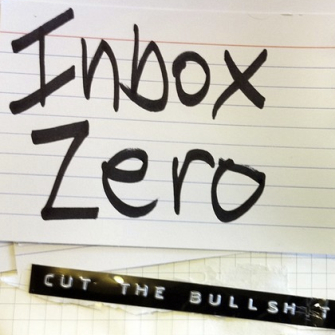Email has taken over our business day as well as nights and weekends. At the beginning of this year, I started keeping track of how much time I spend on email and the results were shocking. The short answer is too much, way too much. Right then, I made a promise to myself that I would (or try to) end everyday with 0 emails in my in-box. At first I thought it was impossible, as I routinely get more than 300 messages a day, but as time went on I not only learned to manage email more efficiently, I took charge on my day. If you are looking to free yourself from the in-box overload, follow along:
Step 1: Every email is not Important
“All my emails are important,” or so I thought. But what I’ve realized now is that every email is not important. Every client is important. Many of my emails are just disruptive. I finally made a choice not to let other people set the agenda for my day. Every email usually pulls me in a different direction, but it’s my job to prioritize and value my time. So before you get pulled into the email overload, list the things you want to accomplish and stay focused on tasks at hand. Don’t let regular in-coming email interrupt your work flow or concentration. Only pause for the truly important.
Step 2: Close Your Mail Program
While it can be easy to get drawn into working from your in-box (it’s almost addictive), I realized it is counterproductive. Now I don’t work from my in-box. I usually turn my mail program off while I am writing or working on a report or coming up with promotional ideas for my clients. Then every few hours I take a look at my in-box, delete the many FYI emails, and file the ones that are important to save.
Step 3: Move Action Items Out of Mail Program
Once my in-box is cleaned up, I assess the emails that need some reply or action. If I can reply quickly, I do and delete the email. If it needs action, I decide what needs to happen and transfer that action item to your calendar. As an example I may add to my calendar: “send proposal to Jeff for the web publicity campaign for his book.” This way I can use my email time to identify the things that are most important and prioritize them in my calendar. If I don’t get something done, I just move it to the next day. But I know I won’t forget to do something important or lose an important email at the bottom of my email pile.
Step 4: Stop Reading Emails Twice
Before I started using my calendar system, I would leave my emails in my in-box until I took care of them. So everyday there would be dozens of emails that I had to read again and remind myself what action I needed to take. Since they were usually not urgent, I would just leave them there. The next day same thing would happen. Thankfully I finally realized that I was wasting a lot of time and energy using my in-box as a to-do list. Now I hardly ever read an email twice.
Step 5: Choose Quality over Quantity
Time management experts tell us there’s a difference between being busy and being productive, and they are right. You can make yourself busy all day long just answering irrelevant emails, but at the end of the day you will feel defeated if you don’t make any progress on your important priorities.
Step 6: Take Break from Email
We all need a break from the constant flow of email. Some days it can be hard to even think. It took me a long time to realize that I was more productive, more creative and more enthusiastic about my work when I took regular unplugged breaks (email and social media). So if possible give yourself some hours or days when you don’t check email at all. Just so you can give yourself some space for creative ideas and big-picture thinking. Read more about this idea in my blog: Finding Balance in a 24/7 World.
Valuing my time by managing my in-box better has not only helped my business, it has also helped my life. You don’t have to be a slave to your in-box. Everyday is precious, so make sure you are doing awesome things with your time.
Fauzia Burke is the Founder and President of FSB Associates, a digital publicity and marketing firm specializing in creating awareness for books and authors. For online publicity, book publishing and social media news, follow Fauzia on Twitter: @FauziaBurke. To talk with FSB and ask your book publicity questions, please join us on Facebook.
Image Credit: www.ecquire.com





